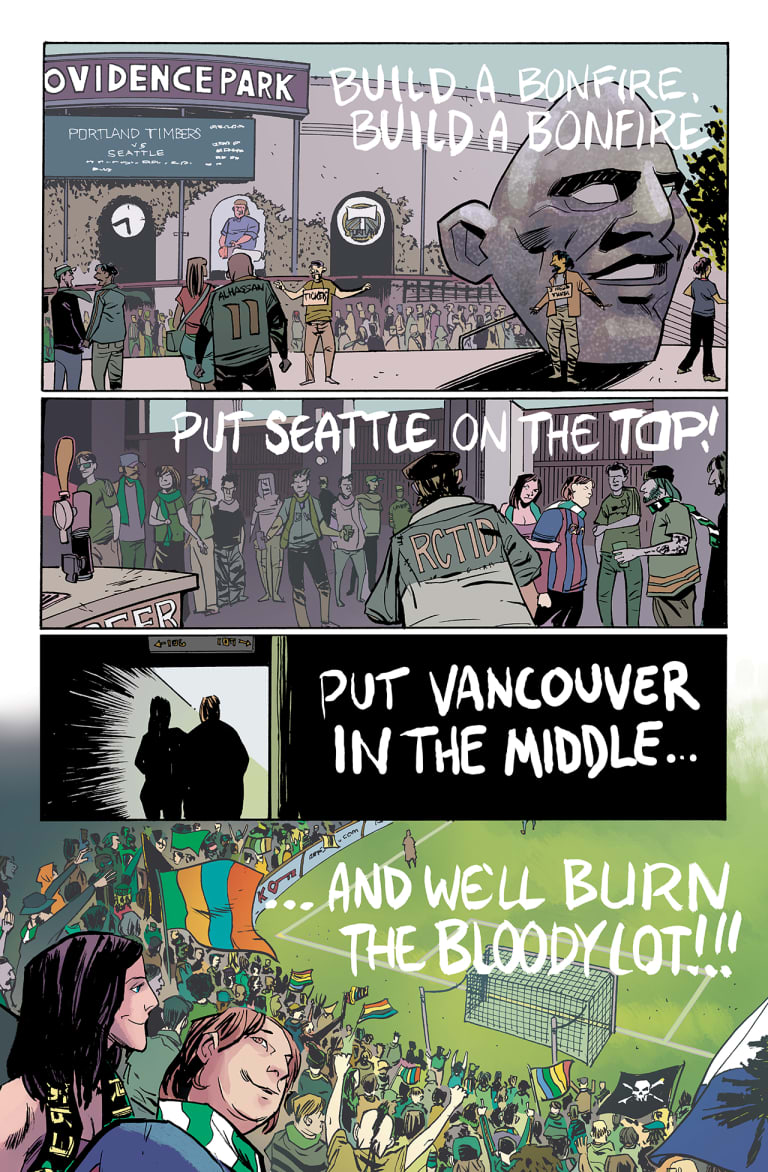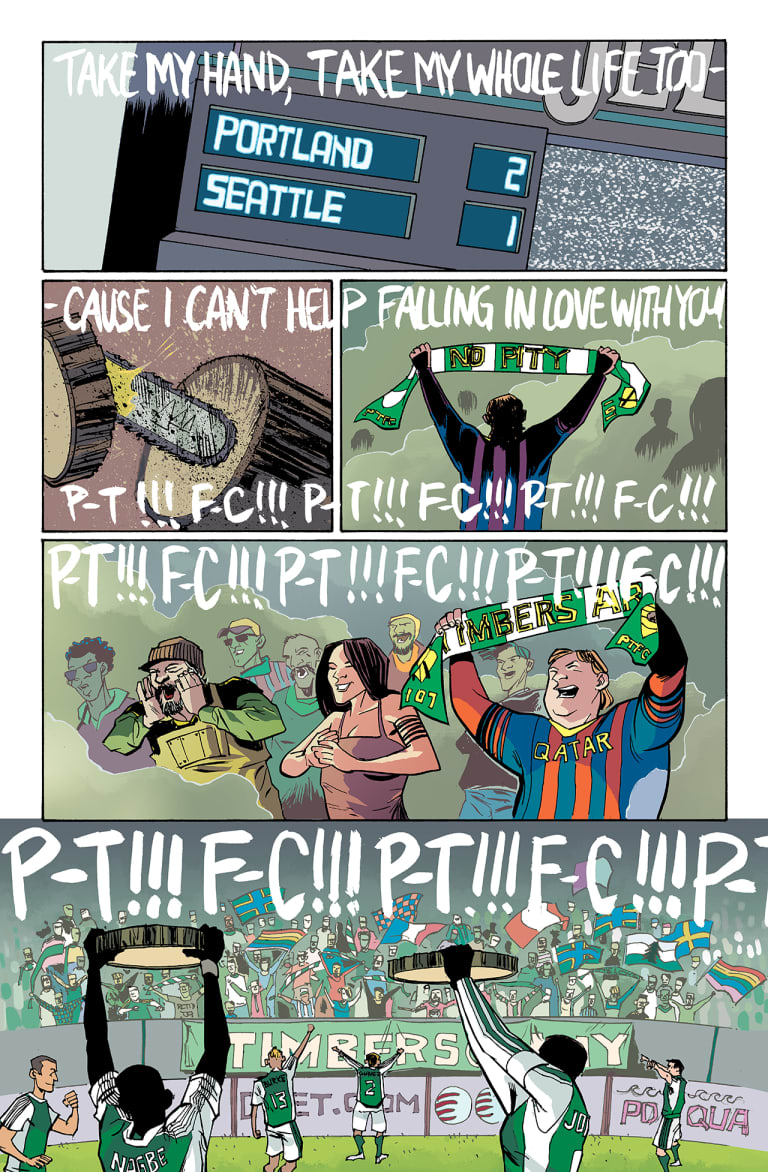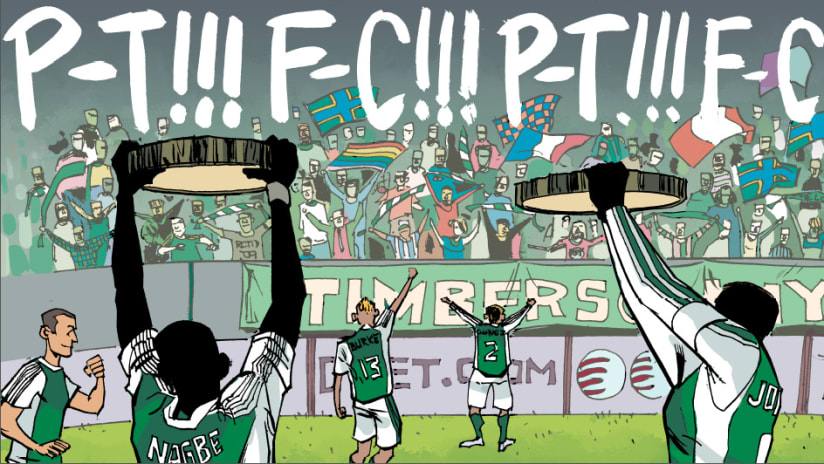The city of Portland has, over time, developed a number of characteristics—some perceived, others real—that have all grown around various perceptions of the place. Whether it be based in satire (Portlandia) or in reality (Bike friendly! Numerous farmers markets! Eco-conscious!), Portland has a definitive character. The moniker of Soccer City, U.S.A. is also part of that same identity. Forged in the early years of NASL play, it continues to this day with the MLS version of the Portland Timbers.
For Timbers fan Greg Rucka, an accomplished writer of comic books (Batman, Spiderman, Wolverine), graphic novels (Queen and Country), and stories adapted into films (Whiteout), Portland is not only his home, but also one of the main characters of his graphic novel series, Stumptown.
Inspired by old 80s detective shows like The Rockford Files and Magnum, P.I., Stumptown follows Dex Parios, a down-on-her-luck private investigator living and working in a fictionalized Portland. Dex, hardly the smoothest P.I., often gets herself in over her head while trying to do the right thing. Battling a local crime lord while helping the downtrodden, she operates in an environment that is a recognizable Portland, if not a bit darker and grittier version of the city.
Dex is also, much like her story’s creator, a Portland Timbers fan.
- HOWLER x TIMBERS: The wild history of Providence Park

For Rucka, having Dex be a supporter of the Timbers is just part of what makes Portland, well, Portland.
“It’s [a] Portland at a slight removed, because they are detective stories,” said Rucka. “But I’ve always felt that setting is a character. Where you put your story influences the story. So Stumptown has always been in part about Portland.
“This is Soccer City, U.S.A., and it was given to me that Dex, and in particular her brother, Ansel, are going to be supporters. That they would be dues-paying 107ist members. That they would have season tickets.”
In the third and most recent volume of the Stumptown series titled The Case of the King of Clubs, Dex takes on a case that happens in and around a massive Portland Timbers-Seattle Sounders Cascadia match. The story opens with Dex and her brother walking into the stadium, chants loudly echoing from the rafters, flags flying and the classic pageantry all in effect. After the match, there’s an incident with one of Dex’s friends away from the game and she must work with a rival P.I. from Seattle to help figure out the case, battle and evade local crime thugs and standoffish cops, all while stumbling through her own hang-up’s and failings.
In the end, it’s partly because of Dex’s love of her team and the community that surrounds it—from both Portland and Seattle—that she’s able to discover a solution.
“In one part, that was an element of community that I want to discuss, because I do think that soccer culture in Portland, and in particular Timbers support in Portland, has always been a part of the city,” explains Rucka. “I’ve lived here for over 20 years now— almost, I think, or just shy 20 years—and it’s always been here. And that is unique.
“I wanted to talk about that community because, like I said, I think that community is a rare and beautiful thing.”
For Timbers fans, the attention to detail around Providence Park and matchday is noticed. There’s recognizable chants, scarves and matchday traditions. Rucka’s real-life Timbers season ticket services representative Dan Zusman even gets a mention (“He is my guy. He has been my guy since the start, and he’s been tremendous.”). However, there’s also an element where Rucka is working to help share not only what the story is about, but just what he loves about Portland and soccer.
“It was trying to pick the right details, and that’s what writing is, ultimately, to me,” he said. “You want to pick the detail that will tell the rest, that is just enough. And the other thing is, even with the growth of the league, even with the explosion of the sport, in particular in the last few years, there’s still way too many who don’t know it and don’t get it.
“Stumptown’s not a book that sells 100,000 issues, but there are people who are picking it up who don’t follow the game and I wanted them to get it.”

Rucka’s fandom of the Timbers started with the dawn of the club’s ascent into MLS but he grew up following the game after being introduced to it from his dad. As a kid, he was a fervent fan of the old PBS show Soccer Made in Germany that would air highlight clips from the Bundesliga.
“For the longest time I thought Franz Beckenbauer was the name of a team,” he remembers with a laugh.
He grew up near a military base and learned more about the game from soldiers who were coming back from special forces assignments in Central and South America who also were community soccer coaches in their free time.
After becoming an accomplished comic book writer for some of the biggest hero names at both D.C. Comics and Marvel, Rucka hit a rut in his writing in the mid-aught’s. By 2009, coming to a Timbers soccer game provided a special kind of release and outlet.
“One of the things that consistently made me truly happy was going to the park, in all sincerity. And win and lose, tie…it didn’t matter,” said Rucka. “Being in the space, being in that community, blowing out my voice for the team, that’s joyful.
“One of the things that we do so well in that first issue is the sense of noise. That the chant is part of the art.”
Portland. Timbers. Soccer. Community. They’re all things that matter deeply to Rucka. Stumptown and in particular this volume, provided a way to get more personal with the character of Dex—the case occurs connected to something she loves in the Timbers—while also broadening Rucka’s feelings about The Rose City.
“Stumptown started as a great, big, sloppy love letter to the P.I. shows that I grew up on as a kid,” he says. “But the book is always looked at as a love letter to Portland, and this story is a love letter to the soccer clubs that are here, and not simply a love of team. It’s a team, community and club. We support these things. That’s what this art gets.”












